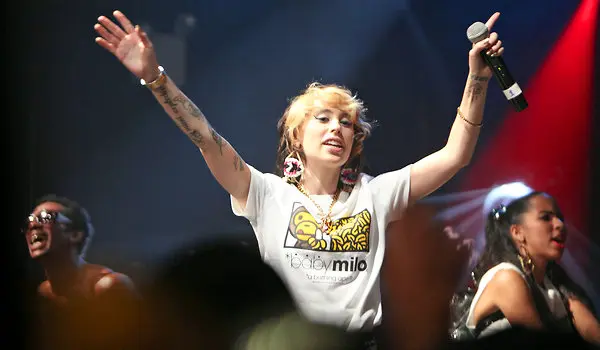White Female Rappers: Breaking Barriers in Hip Hop

Introduction:
In the dynamic landscape of hip hop, where voices often echo stories of urban life, struggle, and empowerment, the emergence of white female rappers has been a significant cultural phenomenon. These artists have challenged stereotypes, shattered glass ceilings, and carved out their own space in a historically male-dominated industry. This article delves deep into the journey of white female rappers, exploring their historical context, artistic expression, social impact, and the challenges they face along the way.
Historical Context:
The roots of white female involvement in hip hop can be traced back to the genre’s early days in the 1970s and 1980s. While hip hop was predominantly associated with African-American and Latino communities, there were notable exceptions like Blondie’s Debbie Harry, whose collaborations with hip hop artists in the early 1980s helped bridge the gap between rock and rap. However, it wasn’t until the 1990s that white female rappers began to gain more prominence, with artists like Yo-Yo and Lisa “Left Eye” Lopes breaking barriers and earning respect within the hip hop community.
Challenges and Stereotypes:
Despite their undeniable talent and contributions to the genre, white female rappers have faced a myriad of challenges and stereotypes. One of the most pervasive stereotypes is the notion that they are mere imitators or appropriators of black culture, rather than authentic participants in the hip hop movement. This perception has led to scrutiny and criticism from both within and outside the hip hop community, with some questioning the legitimacy of their place in the genre.
Cultural Appropriation vs. Authenticity:
The debate surrounding cultural appropriation in white female rap is complex and multifaceted. On one hand, critics argue that white female rappers exploit and profit from black culture without fully understanding or respecting its origins. On the other hand, supporters contend that music is a universal language that transcends race and ethnicity, and that artists should be free to draw inspiration from diverse cultural influences. Navigating this delicate balance between homage and appropriation is a challenge that many white female rappers grapple with in their artistic journey.
Rise to Prominence:
In recent years, white female rappers have experienced a surge in visibility and popularity, thanks in part to the democratizing power of social media and digital platforms. Artists like Iggy Azalea, Cardi B, and Megan Thee Stallion have achieved mainstream success and garnered widespread acclaim for their bold and unapologetic style. Their rise to prominence has shattered stereotypes and expanded the definition of what it means to be a rapper in the 21st century.
Artistic Expression and Style:
White female rappers come from diverse backgrounds and bring a wide range of influences to their music. Some draw inspiration from their own lived experiences, while others use their platform to amplify the voices of marginalized communities. From the raw lyricism of Rapsody to the avant-garde aesthetic of Princess Nokia, white female rappers continue to push the boundaries of creativity and innovation in hip hop.
Collaboration and Community Building:
Despite the competitive nature of the music industry, white female rappers have demonstrated a strong sense of camaraderie and solidarity. Many artists actively collaborate with their peers, both within and outside their own racial and gender identities, in an effort to uplift and support one another. Initiatives like the Women in Hip Hop Festival and the Female Rapper Roundtable provide platforms for female artists to network, collaborate, and share resources.
Impact on Feminism and Gender Representation:
White female rappers have played a pivotal role in challenging traditional gender norms and stereotypes within hip hop culture. By asserting their agency and autonomy, they have helped redefine what it means to be a woman in a male-dominated industry. Their lyrics often touch on themes of empowerment, self-confidence, and resilience, resonating with listeners of all genders and backgrounds.
Social Commentary and Activism:
Many white female rappers use their platform to address social issues and advocate for change. From racial justice and LGBTQ+ rights to gender equality and mental health awareness, they tackle a wide range of topics with passion and conviction. Artists like Angel Haze and Azealia Banks have been vocal advocates for social justice, using their music as a tool for education, activism, and empowerment.
Controversies and Criticism:
Despite their contributions to the genre, white female rappers have not been immune to controversy and criticism. Accusations of cultural appropriation, insensitivity, and privilege have dogged artists like Iggy Azalea and Bhad Bhabie, leading to heated debates and public backlash. While some artists have addressed these criticisms head-on, others have remained defiant or dismissive, further fueling the controversy.
Fanbase and Cultural Influence:
White female rappers have cultivated diverse and dedicated fanbases that span across demographics and geographies. Their music resonates with listeners from all walks of life, inspiring a new generation of fans to embrace their own unique identities and experiences. Beyond the confines of the music industry, white female rappers have also exerted a significant influence on mainstream culture, shaping fashion trends, language, and social norms.
Economic and Industry Impact:
The rise of white female rappers has had a profound economic impact on the music industry, driving sales, streaming, and concert revenues. Their ability to attract large audiences and generate buzz has made them valuable assets for record labels and entertainment companies. In addition, their success has paved the way for greater diversity and representation within the industry, opening doors for aspiring artists of all backgrounds.
Evolution and Future Prospects:
As the hip hop landscape continues to evolve, so too do the prospects for white female rappers. While some artists have achieved mainstream success, others continue to navigate the challenges of carving out their own niche in a crowded and competitive market. However, one thing is certain: white female rappers will continue to push boundaries, challenge stereotypes, and inspire audiences with their creativity, resilience, and unapologetic authenticity.
Conclusion:
The rise of white female rappers represents a seismic shift in the hip hop landscape, challenging stereotypes, breaking barriers, and reshaping the cultural narrative. From the pioneers of the past to the trailblazers of today, these artists have defied expectations, shattered glass ceilings, and paved the way for future generations to follow in their footsteps. As they continue to push boundaries and redefine the genre, one thing is clear: the legacy of white female rappers will endure for generations to come.



